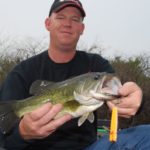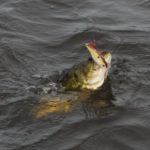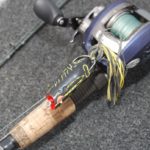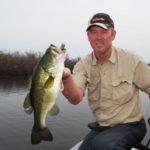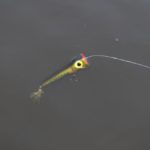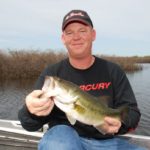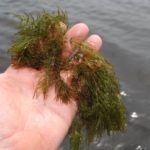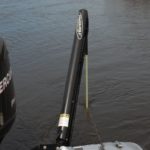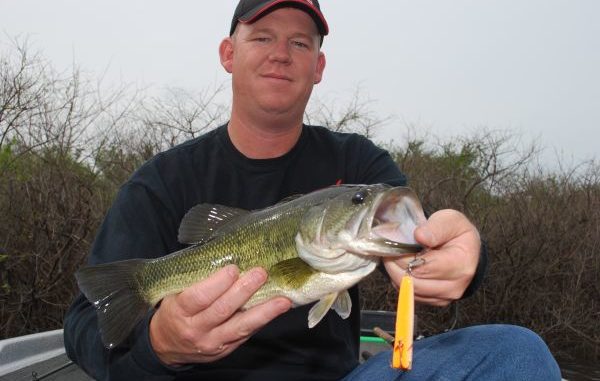
There are a lot of ways to put bass in the boat, but nothing beats a topwater bite. And Larto Lake is guaranteed to offer plenty of that action this month.
Slap-pow!
No matter how ready you think you are, a smashing attack on a topwater plug by an aggressive springtime largemouth bass will make your heart stop.
Guaranteed.
And it wasn’t even my chugger that the fish whacked.
Everything was perfect for a topwater bite. It was early April, and the warmth of spring was in the air. The sky was overcast, so the bass didn’t want to stay in the weeds to avoid the glare. And the water level was A-1 — about 8 inches over the dense beds of water plants in the small lakes and sloughs around Larto Lake.
I met my host, Gerald Mitchell, on a cold February night at one of his two next-door restaurants in Jena. I had just spent all day on Catahoula Lake in a miserable, drizzling rain, riding with local game wardens who were stalking illegal white perch netters. I was working on a book on life behind the badge with this dedicated group of outdoor lawmen.
Tired and damp, the idea of a side of BBQ ribs appealed to me, so I pulled into the Brisket House. I was taking my time and making an effort to get every succulent molecule of meat off of each bone when a 50-ish man with the ruddy complexion of an outdoorsman approached my table to check if I needed anything.
He asked my business in these parts in a friendly way, and when I told him he lit up. I was in white perch country, but Gerald Mitchell told me that I needed to come back and sample the bass fishing in a couple of months. I finished my ribs, walked out into the cold night and promptly lodged the thought in the back of my mind. I had a book to write.
The following September, the same smiling face popped up in front of me at the Louisiana Restaurant Association trade show.
“You didn’t call,” he gently chided. But I hadn’t forgotten about his tale of topwater bass fishing. So we made a date for April.
Joining Mitchell on the water was his 37-year-old son, Stephen. The apple didn’t fall far from the tree here. Both men have had lives in which the outdoors and the food business have been intimately intertwined. Currently, the younger Mitchell owns Town & Country Sportsmen’s Haven in Trout. It’s a feed store that sells a lot of sporting goods, as well as nursery and garden supplies.
“I was raised up hunting and fishing with Daddy and working in the food business with my grandparents at Ginny’s Restaurant,” he explained. “Daddy started taking me in the woods squirrel hunting when I was little.
“I love to tournament-fish (for bass), and I traveled with my dad when he tournament-fished. I fell in love with it. I got to hang around with Larry Nixon, Guido Hibdon, Denny Brauer, Tommy Martin and the Pierce family.
“After Dad got out of tournament fishing, I fished for fun a few years and then got the itch to get back in. The store prevents me from being gone, so I fish in the Bassmaster Weekend Series and with Dad in the Bass Champs circuit in Texas.”
The elder Mitchell listened to his son with understanding in his eyes. He started in the outdoors young, too. He fished Larto Lake with his grandparents, Hubert and Alice Mitchell. By 13, his grandfather had given him a flatboat and a 6-horsepower Evinrude outboard that he used to run trotlines in the Saline-Larto complex.
In 1972, he bought his first bass boat, a Comet with stick-steering powered by a 50-horse Mercury. By 1976, he upgraded to a Hydrosport with a 150 outboard, and he started fishing local tournaments in earnest. He came in first or second most of the time, but couldn’t move into the BASS circuit without the backing of sponsors.
In 1981, he bought a wholesale bait business that sold shiners, crickets, worms and terminal tackle, and resigned himself to just fishing for fun in his spare time — of which there wasn’t much since he was assisting his parents with their three restaurants.
Finding that he deeply missed competitive fishing, he sponsored himself in the B.A.S.S. circuit beginning in 1991 through his bait business, fishing in six tournaments and in B.A.S.S. Megbucks. Then, for a variety of reasons, including taking over the family restaurants, he left the national circuit in 1997.
“I would love to be right back in it — a full-time pro,” he mused as he looked out over Larto Lake from the porch of his family camp. “Not that it’s gonna happen.”
The men started off at a bayou-like drain opening into Shad Lake. The water was 2 feet above pool stage. They began by focusing their casts near the brushy buttonwoods that, along with several other types of woody shrubs, dominate what passes for shoreline in this low country.
Both men used topwater plugs. Stephen was tossing a Heddon Spook Jr., and Gerald was chunking a Storm Rattlin’ Chug Bug. Both men patiently and persistently worked their lures along the perimeter of the drain. Stephen vigorously walked the dog with his Spook, and his dad twitched and blooped the scoop-faced chugger.
Their heads were constantly pivoting and looking for any shad activity. Shad appear after the bass spawn, and the green predators focus on them. In a drain between Ba Ba’s (pronounced Bay-Bay’s by locals in the know) Lake and Shad Lake, the action quickly became intense, with three hook-ups on six casts including a 2 ½-pounder on the Spook and a 3-pound fish on the Chug Bug.
Whenever the action played out in one spot, Stephen used the trolling motor to move the boat to probe another. When the bass started slapping at the topwater lures instead of eating them, Stephen grabbed a rod rigged with a H2O Express in sexy melon. Banks of submerged coontail grass extended out on either side of the drain, but his first cast down the un-vegetated middle produced a hard hit.
Gerald quickly imitated his son, tying on a Strike King Red Eye Shad in green tomato. Both lipless crankbaits produced rapid-fire action in this one spot in the drain, but when the boat moved farther, the hits abruptly stopped.
Back to the surface lures went the two men.
“This is the pattern from late March into June,” Gerald explained. “Then, when the grass gets too bad — near the surface — we switch to a Spro Popping Frog.”
He grunted and set the hook hard on what turned out to be a nearly 5-pounder that swallowed his Chug Bug.
This one, like all the others over 2 pounds, he released. But during the morning’s fishing, he slipped a limit of small bass into the livewell, much to the younger man’s dismay.
“I still like to eat fish,” he explained, almost a little defensively.
Like many tournament anglers who were fun and food fishermen first, Gerald eats some bass.
But the younger man is cut from newer cloth. He has been a competitive fisherman all his life. Bass clearly are to be caught, played with and released. It was almost humorous watching his shoulders slump when, out of the corner of an eye, he glimpsed his dad adding a bass to the well.
The area known in general as “Shad Lake” includes Ba Ba’s Lake, Snaggy Lake and the drains that interlace the area northwest of Larto Lake. Good topwater bass action can be found somewhere in the area during the spring.
One of the most-important keys to finding that action is to be alert.
“Pay attention to your surroundings — fish swirls, bream smacking and shad skipping,” Gerald stressed. “Bass can be bunched up in schools, and you can fish all around and not be on the fish.”
That caught the attention of Stephen, who turned from the bow and added, “A magic spot can be 4 feet wide. You can win a tournament in a small spot like that. Don’t ever give up.
“Make a pattern. Wherever you get bites, try other similar spots. Every bite is important as to what you will do in the next hour. Pattern the fish in relation to cover and current.”
His lecture wasn’t over.
“Don’t ever go with a negative attitude,” Stephen said. “I believe in solunar tables, but I try not to look at them. I want to fish just as hard at 3 p.m. as at 7 a.m.”
Dad Gerald, smiling and obviously pleased with his son’s competitive enthusiasm, punctuated his son’s remarks with a quote: “Kevin VanDam says you gotta believe that every cast is a fish.”
The day went well in the hands of the two pros — a search-and-catch mission. Stephen kept the boat steadily moving with its trolling motor until they found willing fish. Then he either spudded down one or both of his Power-Poles, or if the wind wasn’t too strong he held the boat in position with his trolling motor to thoroughly fish the spot.
When the bite played out, he moved the boat.
By early afternoon, with dozens of bass boated and most released, Gerald latched onto a particularly spunky one.
“Nothing beats a topwater bite, as far as being exciting,” he exclaimed while reeling. “It makes your heart stop a beat when they suck it down.”
Amen. Let’s go eat some BBQ. I know a good place.
